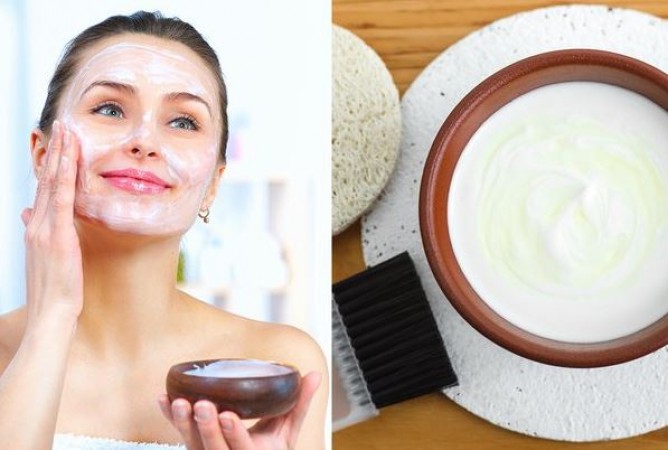
Yogurt, or "dahi," is a common dietary staple, especially during the hot summer months, for its cooling effect on the stomach. However, yogurt is not just beneficial for your digestive system; it can also work wonders for your skin. Rich in lactic acid, yogurt can help soften and brighten your skin. Despite its benefits, it's important to understand that yogurt can also have some adverse effects when consumed or applied topically. Knowing both the advantages and disadvantages can help you make an informed decision about using yogurt in your skincare routine.
Benefits of Using Yogurt for Skincare
Moisturizes the Skin:
Yogurt is an excellent natural moisturizer. If your skin feels dry and lifeless, incorporating yogurt into your skincare regimen can help. The nutrients in yogurt deeply moisturize the skin, making it soft and supple. During the summer, applying yogurt to the skin can provide a cooling effect, soothing any irritation caused by heat.
Reduces Blemishes and Dark Spots:
Exposure to sunlight, dust, and pollution can lead to various skin issues such as blemishes, dark spots, and pimples. Using a yogurt face pack can help address these problems. The lactic acid in yogurt acts as a natural exfoliant, removing dead skin cells and revealing a brighter complexion. Regular application can help reduce the appearance of blemishes and dark spots, giving your skin a more even tone.
Soothes Skin Allergies:
Yogurt contains probiotics and lactic acid, which can help soothe skin allergies and irritation. These components help strengthen the skin's barrier, protecting it from damage and reducing inflammation. Regular use of yogurt can alleviate problems such as itching, dryness, and stickiness, making it a beneficial addition to your skincare routine.
How to Use Yogurt in Skincare
As a Moisturizer:
Apply a thin layer of plain yogurt to your face and neck. Leave it on for 10-15 minutes, then rinse off with lukewarm water. This can help keep your skin hydrated and soft.
As a Face Pack:
Mix yogurt with ingredients like honey, turmeric, or oatmeal to create a nourishing face pack. Apply it to your face, let it sit for 15-20 minutes, and then wash off with lukewarm water. This can help exfoliate the skin, reduce blemishes, and improve overall skin tone.
For Soothing Sunburn:
Apply a generous amount of yogurt to sunburned areas. The cooling effect of yogurt can help soothe the skin and reduce redness.
Drawbacks of Using Yogurt for Skincare
While yogurt has numerous benefits, it can also have some disadvantages, particularly for certain skin types:
May Cause Acne:
Although yogurt is generally good for the skin, it can sometimes cause acne breakouts. This is particularly true for individuals with oily skin. The natural fats in yogurt might clog pores, leading to pimples. Therefore, it is advisable to use yogurt in moderation and observe how your skin reacts.
Allergic Reactions:
Some people may be allergic to yogurt or its components, such as lactic acid. Allergic reactions can include itching, redness, and irritation. If you have sensitive skin, it is crucial to perform a patch test before applying yogurt to larger areas of your skin. Apply a small amount of yogurt to a discreet area and wait for 24 hours to see if any adverse reaction occurs.
Skin Sensitivity:
The lactic acid in yogurt can sometimes be too harsh for sensitive skin, causing irritation or redness. If you experience any discomfort after applying yogurt, it is best to discontinue use and consult a dermatologist.
Yogurt can be a fantastic addition to your skincare routine, especially during the hot summer months. Its moisturizing, exfoliating, and soothing properties make it an effective natural remedy for various skin issues. However, it's essential to be aware of the potential drawbacks and use yogurt cautiously, particularly if you have sensitive or oily skin. Always perform a patch test before incorporating new ingredients into your skincare regimen to ensure they are suitable for your skin type. By understanding both the benefits and disadvantages, you can make the most of yogurt's skincare potential while minimizing any adverse effects.
How Being Overweight During Pregnancy Impacts the Fetus
How Small Changes in Your Commute Can Improve Fitness
How Peppermint Tea Becomes A Super Health Powerhouse, Find Out Here